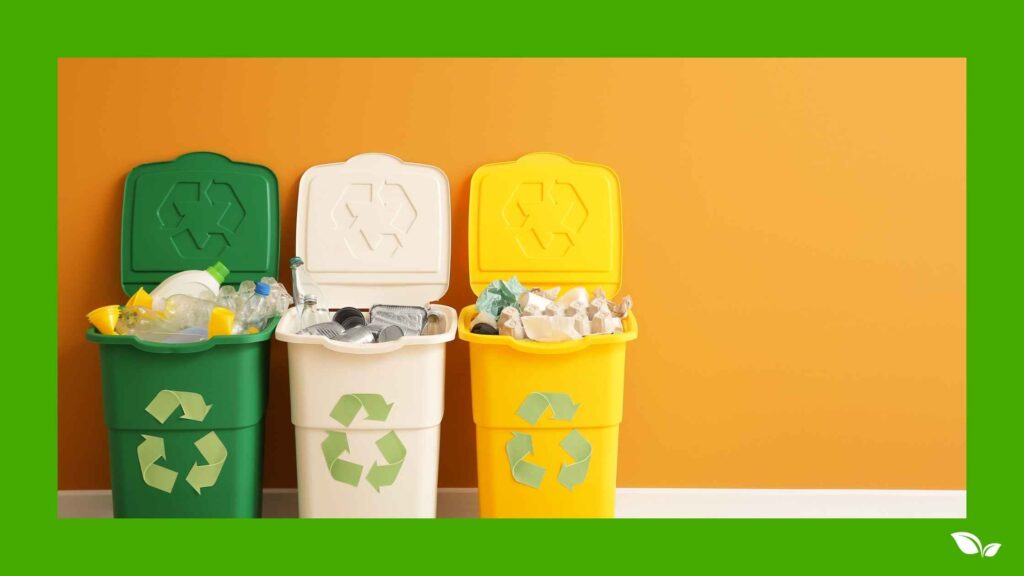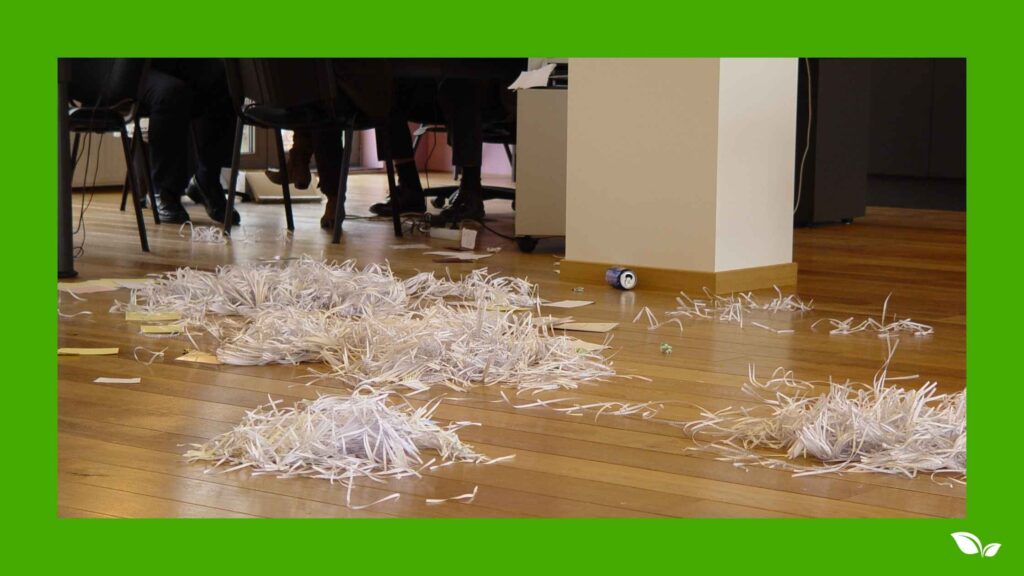1. What Types of Waste Do Offices Produce?
Offices typically generate the four main waste streams, which are general waste, recyclable waste (also known as dry mixed recycling), food waste and glass recycling.
Offices may produce a significant volume of waste due to various operations and the need for regular refreshment of office supplies and equipment.
Whether you manage a bustling city office, a small workspace on the outskirts, or a high-tech corporate hub, implementing an efficient and effective waste management plan will be essential for the compliance and cleanliness of your office.
Proper waste management not only saves your office time and money but also contributes to a greener environment.
Office waste management becomes straightforward when you partner with a company that genuinely cares about sustainability.

What Kinds of Waste Do Offices Produce?
General Waste
- Single-Use Office Supplies: Disposable stationery, packaging, and office amenities.
- Old Office Furniture: Worn-out or broken chairs, desks, or fixtures.
- Non-Recyclable Packaging: Materials like cling film, Styrofoam, and foil.
- Cleaning Supplies: Empty containers of cleaning chemicals and materials.
Recyclable (Dry Mixed Recycling)
- Paper Products: Newspapers, magazines, brochures, and any shredded documents.
- Plastic Bottles and Containers: Empty plastic milk bottles, water bottles and other packaging.
- Metal Cans: Empty cans for beverages or food.
- Cardboard Boxes: Packaging materials and boxes from deliveries.
- Office Paper: Used paper from offices, including documents and printouts.
- Ink Cartridges: Recyclable ink and toner cartridges from printers.
Proper segregation and recycling of these materials reduce the environmental impact and promote sustainability in offices.
Food Waste
- Expired or Spoiled Food: Perishable items past their expiration date or spoiled.
- Leftovers: Uneaten food from break and lunch times or from conferences
- Overproduction/Uneaten Inventory: Unserved or untouched food from the office staff room or from in-person meetings
- Spilled/Ruined Food: Food that’s spilled, overcooked, or burned.
Efficient food waste management in offices helps to minimise the environmental impact of your employees’ food wastage and cut down on operating costs.
Glass Waste:
Glass waste generated by offices typically includes:
- Beverage Containers: Empty glass bottles from beverages.
- Glassware: Broken or chipped drinking glasses, wine glasses, and mugs.
- Office Service Containers: Glass containers used for office service items like condiments.
- Food Storage Containers: Jam jars. Properly sorting and collecting glass waste for recycling helps reduce environmental impact, conserve resources, and promote sustainability.
Recycling glass can also lead to substantial cost savings for your office waste management.

2. Why is Office Waste Disposal Important?
Proper office waste disposal is crucial because it not only leads to significant cost savings but also supports wider sustainability initiatives and ensures compliance with environmental regulations.
For any office, effective waste management goes beyond simply “taking the bins out.” It means having clear processes in place for separating recyclables, handling confidential documents securely, and reducing the amount of general waste sent to landfill.
When waste isn’t managed efficiently, the impact can be felt on several levels. Financially, your business may face higher collection and disposal charges, along with potential penalties for non-compliance.
Environmentally, poor practices can contribute to climate change through increased greenhouse gas emissions, as well as damage to the local environment around your workplace. Just as importantly, a lack of responsibility in this area can affect your organisation’s reputation with clients, staff, and stakeholders who increasingly expect businesses to act sustainably.
1. Cost Savings for Offices
Efficiently organising waste disposal in your office with separate bins can result in substantial cost savings.
The expenses for waste collection are influenced by factors such as waste type, pickup frequency, bin size, and government-mandated excess weight fees.
Segregating waste into distinct streams can reduce the weight in general waste bins or mixed recycling bins, helping offices avoid incurring additional charges due to excess weight in other waste streams.
While investing in additional waste bins may appear costly in the short term, it often proves to be a cost-effective strategy in the long run.
2. Environmental Responsibility
Offices can generate huge amounts of waste and need to take responsibility for reducing their impact on the environment by managing their waste more effectively.
Implementing separate bins for distinct waste streams, is now mandatory under UK law. This requirement is set out in the Environmental Act 2021 first and Simpler Recycling in April 2025, which establishes legally binding environmental improvement targets across the entire UK.
3. Diverting Waste from Landfills
In offices, sorting waste into different categories will help the amount of waste sent to landfills, where harmful methane gas is a huge problem due to compressed food waste etc.
When offices categorise their waste as food waste, and dry mixed recycling rather than just general waste, they improve the likelihood of responsible recycling and environmentally friendly disposal. For offices over 10 employees by the Simpler Recycling legislation, these waste streams must be separated.
4. Reducing Methane Emissions
In office environments, food waste plays a significant role in overall waste. Separating food waste into its own dedicated stream is now a legal requirement for businesses ensuring compliance with UK waste legislation and reducing the amount of waste sent to landfill.
When food waste ends up in the general waste bins, it can head to a landfill, where it decomposes without oxygen and releases methane, a harmful greenhouse gas.
To address this issue, the government have set in place legislations across the England, Scottland and Wales, enforcing waste segregation will help us take care of our environment and planet.
This approach not only reduces the environmental impact but can often result in cost savings for the office as well. Win-win!
5. Promoting Recycling
In office environments, having separate bins for recyclables, promotes recycling practices.
Busy office workers prioritise convenience and efficiency.
By having clearly labelled, easily accessible recycling bins, it will be much more likely to be used by your staff.
Recycling helps save valuable resources and energy and contributes to a greener environment.

3.Why Choose Waste Basics for Your Office Waste Management?
Waste Basics is the best choice for your waste management needs.
Offices, as part of the corporate sector, generate substantial waste, presenting significant environmental challenges locally and globally.
At Waste Basics, we conduct a thorough annual evaluation of all our waste collection partners in the office and corporate sector to ensure their commitment to minimising their environmental impact.
Should any of our existing partners fail to meet our strict sustainability criteria, we take swift action, discontinuing our partnership and seamlessly transitioning our valued customers to alternative suppliers.
If you prioritise your office’s environmental responsibility and seek a waste broker truly dedicated to sustainable waste management in the corporate sector, look no further than us.
What is Confidential Waste?
Confidential waste includes any documents or materials that need to be thrown away that contain sensitive or private information e.g. financial records, customer data, legal documents, or any data that, if exposed, could compromise security, privacy, or business interests.
At Waste Basics, we understand the importance of safeguarding sensitive information and offer secure, comprehensive solutions.
The Confidential Waste Collection Process
Step One: Fill Up Your Confidential Waste Bin
Fill up your confidential waste bin with your documents.
Step Two: Secure Transport and Shredding
Confidential waste bins collected by professional waste disposal companies are transported to secure facilities for shredding.
These facilities employ stringent security measures, including CCTV surveillance and controlled access. The documents are shredded into irreparable pieces.
Step Three: Eco-Friendly Recycling
After shredding, the materials are recycled in an environmentally responsible manner, promoting sustainability and minimising the environmental footprint while ensuring secure information destruction.

4. What is The Office Waste Collection Process?
How does office waste collection work, and what are the next steps?
Check out the simple process below!
1) Choose Your Bins
At Waste Basics, we simplify the management of your office waste collection, ensuring its the most seamless and efficient process it can be.
We recognise your office’s need for high-quality service at the most competitive rates, and we’re here to assist you in achieving just that.
2) Arrange Free Delivery of Your Bins
When you choose our office waste collection services, you can say goodbye to any unexpected fees for bin rental or delivery, setting us apart from other national waste collectors who can charge obscene rates for this service.
We’re committed to promptly delivering the bins you need for your office waste without any unnecessary costs.
We understand the significance of convenience and will collaborate with you to establish a customised delivery schedule that aligns with your office’s unique requirements.
We’ll handle any logistical challenges, whether it involves ensuring access to locked gates or secured areas, enabling you to concentrate on the smooth operation of your office.
Rest assured, when you opt for Waste Basics, our primary focus is on simplifying the entire process for you, ensuring a seamless and efficient waste collection experience for your office.
3) Fill Up Your Bins
Once the complimentary bins have been delivered to your office’s location, you can proceed to fill them with your office waste, making sure that each waste stream is properly separated into the correct bin.
4) Get Your Waste Collected
We’ll establish a customised schedule that fits your office, ensuring it aligns with the volume of waste your workplace generates.
At Waste Basics, we keep recycling simple, transparent, and affordable. Get your free quote today and see how much you could save.
![Recycle_paper_bin_overflowing[1]](https://wastebasics.co.uk/wp-content/uploads/2023/11/Recycle_paper_bin_overflowing1-2240x1120.jpg)





